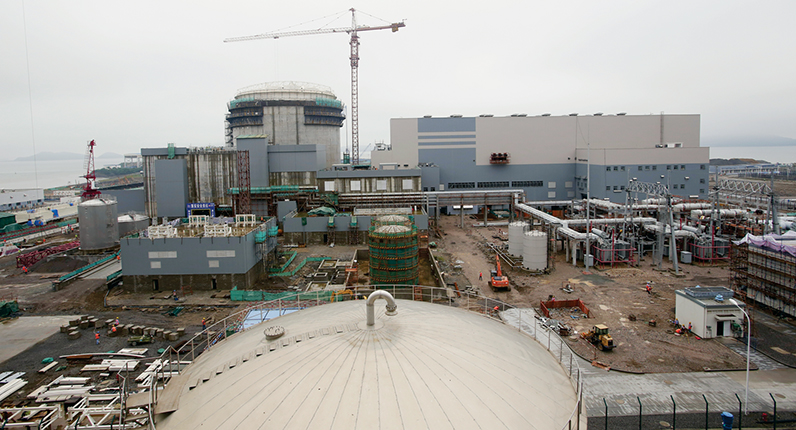Renewal of Sino–US nuclear accord in question
DOI: 10.1063/PT.3.2841
An agreement that for 17 years has undergirded cooperation between the US and China on civilian nuclear energy is due to expire in December. Some senators and nonproliferation experts are worried that the Obama administration’s proposed follow-on accord, submitted to Congress for approval, rewards a country that has a spotty record on preventing the smuggling of nuclear and ballistic-missile technologies to other countries.
Section 123 of the 1954 Atomic Energy Act requires a new bilateral agreement to be put in place for nuclear commerce to continue between the two nations. At a 12 May hearing, Thomas Countryman, assistant secretary of state for international security and nonproliferation, told the Senate Foreign Relations Committee that the administration’s proposal, the product of two and a half years of negotiations, would impose significant new nonproliferation obligations on China.
The new pact also would advance US efforts to limit climate change, he said. China is the world’s largest emitter of carbon dioxide, and its rapidly growing electricity needs are being satisfied primarily with new coal-fired power plants. President Xi Jinping last year pledged that China’s carbon emissions would peak in 2030, then begin to decline.
The pro-industry Nuclear Energy Institute warned in a recent white paper that failing to renew the agreement could exclude US suppliers from participating in the world’s fastest-growing market for nuclear power. There are 24 reactors under construction in China, according to the World Nuclear Association. Four of those are Westinghouse Electric Co’s AP1000 advanced pressurized water reactors.

A Westinghouse AP1000 pressurized water reactor under construction in Sanmen County, on the east coast of China. A new agreement is required for continuing nuclear trade between the US and China.
WESTINGHOUSE ELECTRIC CO

A Westinghouse executive last year said the company is negotiating to sell eight more AP1000 units to China, in a deal worth an estimated $24 billion. According to an April report from the Congressional Research Service, the company’s first four reactor sales have created or are sustaining approximately 8000 direct US jobs and another 20 000 or so indirect ones.
A blank check?
A controversial provision in the proposed new agreement would give China advance approval to reprocess spent fuel produced by reactors of US origin. Administration officials say the up-front approval simply acknowledges that China already has long-standing reprocessing facilities and experience. They note that military use of the plutonium produced is expressly prohibited by the draft agreement and that the reprocessing facilities will be subject to international inspections.
But critics maintain that the US should approve reprocessing on a case-by-case basis. Henry Sokolski, executive director of the Nonproliferation Policy Education Center, says the “blank check” approval for reprocessing would extend for 30 years, during which the geopolitical environment in Asia could shift and China might decide to rapidly build up its nuclear forces. In that event, China could exhaust its military stockpile of plutonium and turn to civilian material. “You don’t stay out of trouble by ignoring potential trouble. That’s what we’re doing,” Sokolski says.
China’s record on nonproliferation has improved markedly since the 1985 signing of the soon-to-expire 123 agreement, Countryman testified at the Senate hearing. Due to Sino–US tensions, that agreement didn’t take effect until 1998. But Countryman acknowledged that China’s state-owned sector is still supplying reactors to Pakistan, a situation that contravenes its commitments as a member of the Nuclear Suppliers Group (NSG), the 48-nation body that sets the rules for international commerce in dual-use technologies and potential nuclear weapons materials.
Chinese individuals and privately owned businesses continue to broker illicit sales of dual-use items to Iran and North Korea, he said. One Chinese national, Li Fangwei, who has been indicted in the US, has been a “primary procurement agent for Iran’s nuclear ballistic missile program,” Countryman said. Li allegedly has provided Pakistan with high-tech missile components from China and other nations.
Some committee members cited Li’s continued operations as evidence of China’s lack of commitment to nonproliferation. Senator Ed Markey (D-MA) suggested that China had simply “subcontracted out” its proliferation operations to private entities. “I think it’s preposterous to conclude that the Chinese government is incapable of shutting this down,” Markey said. While Li is “running a nuclear eBay,” the government has figured out how to arrest and jail activists and journalists and imprison thousands of ethnic Uyghurs, he said.
Countryman acknowledged that the Chinese government has neither shown the level of political commitment nor devoted the resources to effectively control exports. Unlike state-owned enterprises, China’s private sector is “something like the Wild West in being free of government regulation,” he said, and the high-tech sector in particular “aggressively seeks other markets.”
But US officials maintain that a new accord will keep the pressure on China to improve its nonproliferation record. “If we are to continue the journey of bringing the Chinese more into what we consider the international norm and standard related to nonproliferation, nuclear security, and safety standards, it involves us interacting with them,” testified Frank Klotz, administrator of the Department of Energy’s National Nuclear Security Administration.
Quieter submarines
Senator Bob Menendez (D-NJ) said it was likely that China has adapted the AP1000’s advanced coolant pumps for use with reactors on its ballistic-missile submarines. Quieter than the pumps used on other nations’ shipboard reactors, they would allow the Chinese to build quieter, less detectable submarines. In April testimony to the Senate Armed Services Committee, Samuel Locklear, commander of the US Navy’s Pacific Command, said that China may add up to five more ballistic-missile subs to its existing three-sub fleet by the end of the decade.
Sokolski isn’t surprised by the apparent Chinese reverse-engineering of the AP1000 pumps; he notes that three House members had written in 2007 to then secretary of defense Robert Gates to warn about the danger. “The impression I got [then] was that [the lawmakers] were told, ‘Don’t worry,’ ” he says.
A nonproliferation assessment the White House submitted to Congress with the proposed agreement acknowledged ongoing Chinese duplication of US technologies: “China’s strategy for strengthening its military involves the acquisition of foreign technology as well as greater civil–military integration, and both elements have the potential to decrease development costs and to accelerate military modernization.”
Countryman acknowledged that the Chinese “will make every attempt” to benefit from US nuclear technology, including militarily. “Our job, which only begins with this 123 agreement but is actually carried out through the licensing procedure, is to frustrate that effort. We have every intention of doing so and believe we have the means to do so.”
Senate Foreign Relations Committee chairman Bob Corker (R-TN) indicated that senators are likely to attach conditions to the proposed agreement. The House Foreign Affairs Committee also plans to review the pact.
President Obama sent the proposed agreement to Congress on 21 April. Lawmakers have 90 working days to approve or disapprove it. The president could accept the lawmakers’ conditions or veto a resolution of disapproval.
More about the authors
David Kramer, dkramer@aip.org




